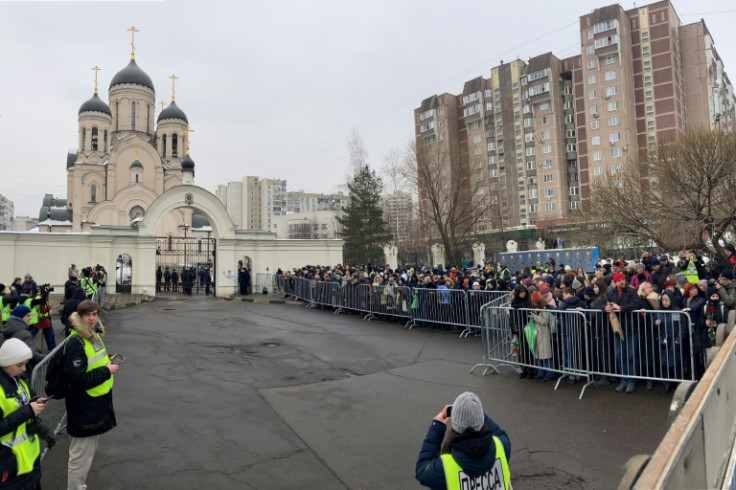Massive Turnout In Moscow As Navalny's Funeral Takes Place Amid Security Concerns

Thousands of Russians gathered on the outskirts of Moscow on Friday for the funeral of the late opposition leader, Alexei Navalny, in a ceremony marked by sorrow and stringent security measures.
The sizable crowd included prominent figures such as Boris Nadezhdin, an anti-war candidate recently disqualified from running against President Vladimir Putin, and Yevgeny Roizman, the former mayor of Yekaterinburg known for his vocal criticism of Putin, BBC reported,
Western diplomats, hailing from the U.S., France, and Germany, were present at the funeral, underscoring its international significance. However, the solemn occasion unfolded under a veil of secrecy, with cameras prohibited inside the church and livestreams hampered by internet disruptions, leaving many details of the service unknown.
A poignant image circulated online, capturing Navalny lying in a rose-covered open casket, surrounded by a small gathering paying tribute, including his parents holding candles. This poignant moment highlighted the challenges faced by Navalny's team in organizing the funeral.
In the days leading up to the ceremony, Russian law enforcement detained several mourners, raising fears expressed by Navalny's widow, Yulia, about potential crackdowns on those paying their respects.
Reports from the rights group OVD-Info indicated that at least four people were detained as they attempted to travel from the southern city of Voronezh to attend the burial service and funeral, including a local campaign coordinator for Nadezhdin.
Navalny's team has alleged constant obstruction from Russian authorities since his sudden death in a penal colony north of the Arctic Circle in February. The challenges ranged from the refusal to release Navalny's body to reported pressures on Moscow venues not to host the funeral.
Despite the absence of an explicit ban, signs pointed towards authorities treating the funeral with suspicion, with reports of detention vans present at the scene. Even on the eve of the funeral, Navalny's spokesperson revealed the struggles in finding a hearse for the procession to the Church of the Icon of Our Lady Quench My Sorrows in the neighborhood of Maryino.
The funeral not only became a farewell to a prominent opposition leader but also a symbol of resistance against perceived political repression. Mourners shared stories of receiving warnings from the police in the days leading up to the event, underlining the tense relationship between dissenters and the Russian authorities.
As the casket was transported to a nearby cemetery for Navalny's burial, the crowd outside the church faced the harsh cold, a testament to the enduring struggle for justice and political change in Russia.
According to Politico, The Kremlin, through spokesperson Dmitry Peskov, maintained a guarded stance, stating that they had "nothing to tell to Navalny's relatives," underscoring the ongoing friction between the opposition and the government. The funeral of Alexei Navalny serves as a poignant chapter in the complex narrative of political dissent and resistance in contemporary Russia.
© Copyright IBTimes 2025. All rights reserved.





















